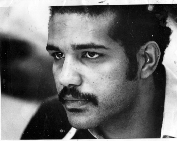|
HAITIInsight is the
National Coalition for Haitian Rights' bimonthly bulletin on refugee and
human rights affairs. Published since 1989, HAITIInsight
has gained a solid reputation as a credible source of information for
human rights activists, researchers, immigration lawyers and advocates,
as well as officers of the U.S. Immigration & Naturalization Service
and other agencies of the U.S. government.
Haiti Insight Volume 7, No. 6
 NCHR's Jocelyn McCalla on
the Immigration Battle:
NCHR's Jocelyn McCalla on
the Immigration Battle:
It's Time for Haitians to
Get a Break
Last year, President Clinton and Congress adopted legislation that made Nicaraguan
and Cuban immigrants who had been in the United Since before 1996 eligible for "green
cards." In the same legislation, Guatemalans, Salvadorans, and immigrants from former
Eastern Block countries were declared eligible for suspension of deportation under
pre-1996 immigration law and rules. Haitians were excluded from any of these benefits.
Last Fall, refugee advocates launched a campaign on their behalf which resulted in a
partial victory last December 23, when President Clinton granted Deferred Enforcement
Departure (DED) to Haitian asylum-seekers. But more work needs to be done. In January, HAITIInsight's
Insight's
J.P. Slavin interviewed NCHR Executive Director Jocelyn McCalla about the lobbying
campaign that is underway to grant more protections to Haitian immigrants and refugees.
Here are excerpts from the interview:

HAITIInsight: What does President Clinton's decision to grant
Deferred Enforcement Departure (DED) mean for Haitian
refugees?
McCalla: The Administration is essentially saying that these refugees
will be shielded from deportation for a period of one-year and will be given the
permission to work in this country during that time so that they can fend for themselves.
The government will not provide them with other relief. So there are three things to know
here. One, the DED order is limited to Haitian asylum seekers. Two, the commitment to
shield people from deportation is only for a one-year period. The President has the
authority to extend it for another year or for another period of time, which by previous
practices has been no longer than 18 months.
Third, the President said he was going to seek a permanent solution to this situation.
And that solution will hopefully be a green card for these people. This is not set in
stone, since the President does not have complete control over this situation. It's really
more of a Congressional decision.
Public support and pressure is really needed if Haitians are to be given the benefits
that Cubans and Nicaraguans got last year. Especially in Congress. NCHR will be
campaigning pretty hard for such an outcome this year. But more support has to come from
the Haitian community and from people who believe that it is only fair that Haitians get a
break.
HAITIInsight: Is it Congress that really has the power to
provide these refugees with green cards?
McCalla: Yes, the President by himself cannot grant the green cards.
It has to come from legislation that specifically targets Haitians.
HAITIInsight: It's estimated that Clinton's DED order will
protect about 20,000 to 40,000 Haitians. What were the circumstances that led to their
entry to the United States?
McCalla: Most of them entered from the refugee camps in Guantánamo
Bay, Cuba during 1991 to 1994. Many were interdicted on the high seas by the U.S. Coast
Guard and taken to Guantánamo Bay where INS asylum officers determined they had a
credible fear of persecution and would be allowed onto U.S. soil to convince an asylum
officer, or an immigration judge, that they had a well-founded fear of persecution. It was
not a guarantee, however, they would get asylum.
About 10,500 of these refugees were brought in and resettled in the U.S. Just after the
1994 military intervention into Haiti, there were several hundred more Haitians who were
paroled into the United States, including unaccompanied minors who left Haiti on boats
without their parents or guardians.
It's important to note that Congress did not make a distinction between Nicaraguan
asylum-seekers and other Nicaraguan immigrants when it made them eligible for permanent
residency. Congress acted to give green cards to all Nicaraguan immigrants who were in the
United States before December 31, 1995 as long as they met certain conditions like good
moral character, not being arrested, and so on.
Haitians contend that they deserve no less than what the Nicaraguans received. This
means any Haitian who was in the country before December 31, 1995 has the right to get a
green card.
HAITIInsight: How many Nicaraguans benefited from the
Congressional action last year?
McCalla: Initially they thought about 50,000 Nicaraguans would be
eligible for green cards. But now the figure is said to be about 150,000.
HAITIInsight: When did Central Americans begin to lobby
Congress to win these immigration benefits?
McCalla: When the immigration laws were reformed in 1996, it put
Nicaraguans, Salvadorans and Guatemalans in jeopardy, especially since a number of the new
immigration laws were retroactive and speeded up the asylum process and deportation
procedures.
Furthermore, these immigrants over the years had been granted various forms of relief
from deportation. Every Administration starting with President Reagan had given them
various forms of temporary relief. In some cases, their protection from deportation may
have been renewed for 10 or 15 years.
Suddenly in 1996, the immigration law was changed. And with the new law retroactive,
the new guidelines threatened their livelihood. So they began to organize in 1996. And
they organized in a big way. They mounted a consistent lobbying effort where activists
lobbied Congress on a regular basis. The Governments of El Salvador, Guatemala and
Nicaragua similarly pressured the Clinton Administration.
The Administration then developed a bill and looked to find sponsors and co-sponsors in
the Congress. The Senate adopted a bill that restored the right of Central Americans to
suspension of deportation status under pre-1996 laws should they be able to prove extreme
hardship if deported, especially after having lived for several years in the U.S. and
having built equity here. It was estimated that there were about 500,000 immigrants from
these three countries in the United States.
In the House, the chair of the sub-committee on immigration, Congressman Lamar Smith
from Texas and the Speaker came up with a plan to give Nicaraguans the chance to get green
cards immediately, and provide Guatemalans and Salvadorans with the opportunity to get
stays of deportation orders. To be frank, there are a lot of Nicaraguans in southern
Florida and there is a lot of support for Republicans in that community.
When the debate got to this stage, the Haitians came into it. Last September, Haitians
started to demonstrate to make the point they deserved as much consideration in south
Florida as the Nicaraguans.
The Administration decided not to fight the House plan and give Republicans an
opportunity to put down stronger roots with the Hispanic community. So they supported the
House proposition.
To me the lesson of all this is less than a year after harsh immigration measures were
put on the books, they were softened overwhelmingly by Congress. The numbers in support of
the changes were similar to the votes in favor of the original legislation. It shows what
a good lobbying campaign, a grassroots campaign, can quickly accomplish.
HAITIInsight: Why were Nicaraguans singled out for the better
benefits?
McCalla: Many of the Nicaraguans supported the US-sponsored Contra war
in the 1980s. The measure was sold to the Republican party and others as a kind of a
reward for their struggle against the Sandinistas.
HAITIInsight: So when Haitians began to press Washington to
get the same benefits as Nicaraguans, they concentrated on Administration support and less
on Capitol Hill?
McCalla: They targeted both, given that the White House was actually
in a position to say to the Republicans that "if you are going to play the game this
way, we want the Haitians to have special treatment as well." But by the time
advocates for Haitians began their campaign, the train had already left the station. We
caught up with it, and we tried to hang for dear life. Unfortunately, we were unable to
hang on and were pushed off. Our compensation was DED.
HAITIInsight: How did refugee advocates convince the
Administration to support the DED order?
McCalla: Our case with the President was made by several Congress
people. Representative Carrie Meek of Florida played a lead role in galvanizing support
among Democrats. She has introduced a bill that would provide the same benefits to
Haitians that Nicaraguans are receiving. She has about 65 co-sponsors. The Congressional
Black Caucus, the Congressional Hispanic Caucus and Democratic leaders are all taking
part. But you need about 213 votes to win a majority. So it's still going to be an uphill
fight.
HAITIInsight: What is needed to make DED work?
McCalla: As we speak, there are no guidelines on what eligible
Haitians need to do to get DED. The INS must publish them so we can inform and educate
Haitians who are eligible for DED about the proper procedural steps they should follow to
qualify. We have to make it clear that DED is not an amnesty. It's only temporary
protection.
Resources are also crucial. If we're going to get the word out about DED and continue
the fight in Washington, we need more assistance. We need more volunteers and activists.
We also need financial support.
We're going to have to pick it up where we ended last December with the DED victory.
That means letter writing, phone calls, office visits in Washington, rallies. We have to
educate Congress people about what Haitians feel is their fair share. Refugee rights
groups and civil rights groups want to help us, and we have to forge deeper ties with them
if we're going to be successful.
Most importantly, every Haitian in the United States must tell themselves that our time
has come to demand and get a fair share. We can be found in all walks of life in the U.S.
From the pinnacle of Wall Street brokerage firms to the daily grind of chauffeuring
customers in New York taxis. The key thing here is to act upon that knowledge for the
common good of all Haitians in the U.S.
Back to HAITIInsight home page
HAITIInsight is automatically included with the basic individual
membership subscription of $25 per year. A one-year subscription for non-members,
libraries and other institutions is set at $35.
We invite you to send in announcements, news stories and essays to Patrick Slavin,
Editor. Patrick can be reached at (212) 337-0005 extension 13, or by simply selecting the
"send e-mail" icon at the bottom of this page.
Story length should be between 600 and 900 words (about 2.5 to 4 double-spaced pages).
Please be sure to include your address and telephone number. Submissions sent via e-mail
are preferred (insight@nchr.org). Our second-best option is to urge you to send the file
on an IBM-compatible diskette. Otherwise, you may fax it to us at (212) 337-0028. NCHR's
address is: 275 Seventh Avenue, 25th floor, New York, NY 10001-6708, USA. Please note that
submission of an article does not guarantee publication.
|